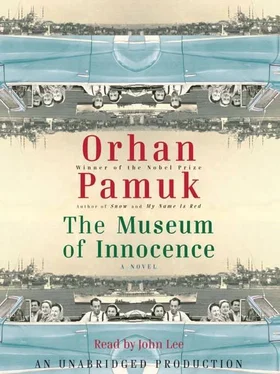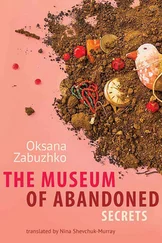On the following day, Wednesday, April 30, 1975, I sat in the Merhamet Apartments between 2 and 4 p.m., waiting for Füsun, who never came. I was a little heartbroken and confused; returning to the office, I felt troubled. The next day I went back to the apartment, as if to temper my disquiet, but again Füsun didn’t come. Sitting in those airless rooms, surrounded by my mother’s old vases and dresses and dusty discarded furniture, going one by one through my father’s amateurish snapshots, I recalled moments from my childhood and youth that I hadn’t even realized I’d forgotten, and it seemed as if these artifacts had the power to calm my nerves. The next day, while eating lunch at Hacı Arif’s Restaurant in Beyoğlu with Abdülkerim, the Kayseri dealer of Satsat (and a friend from my army days), I recalled with shame that I had spent two consecutive afternoons waiting for Füsun in an empty apartment. I was so embarrassed I decided to forget about her, the fake handbag, and everything else. But twenty minutes later, as I glanced at my watch, it occurred to me that Füsun might be walking toward the Merhamet Apartments at that very moment with the refund for the handbag; making up a lie for Abdülkerim, I wolfed down my food and rushed off.
Twenty minutes after I got there, Füsun rang the bell. Or rather, the person who could only be Füsun rang the bell. As I ran to the door I remembered that the previous night I had opened the door to her in a dream.
In her hand was an umbrella. Her hair was dripping wet. She was wearing a yellow pointille dress.
“Well, well, well, I thought you’d forgotten all about me. Come on in.”
“I don’t want to disturb you. Let me just give you the money and go.” In her hand was a worn envelope on which were imprinted the words “Outstanding Achievement Course,” but I didn’t take it. Taking hold of her shoulder, I pulled her inside and shut the door.
“It’s raining hard,” I said, although I’d not noticed the rain myself. “Sit for a while. There’s no reason why you should rush out into the rain and get wet again so soon. I’m making some tea. At least warm yourself up.” I headed for the kitchen.
When I returned, Füsun was looking over my mother’s old furniture, her antiques, dusty clocks, hatboxes, and accessories. To make her feel more at home, and to encourage conversation, I told her how my mother had bought all these things on impulse from the most fashionable shops of Beyoğlu and Nişantaşı, pashas’ mansions whose furnishings were being sold off, Bosphorus yalis half destroyed by fire, antique dealers, and even vacated dervish lodges, not to mention all the shops she visited on her European travels, but that after using them for a short while she brought them here and forgot all about them. At the same time I was opening trunks packed with clothes reeking of mothballs, and the tricycle that we’d both ridden as children (my mother was in the habit of giving our old ones to poor relations), a chamber pot, and finally the Kütahya vase that my mother had asked me to find for her; then I showed her the hats, box by box.
A crystal sweet bowl reminded us of holiday feasts she had attended. When she’d arrive with her parents for their holiday visit, they’d be offered an assortment of sugar and almond candies, marzipan, sugar-covered coconut “lion bars,” and lokum , or Turkish delight.
“Once when we came here for the Feast of the Sacrifice, I remember we went out for a ride in the car,” said Füsun, her eyes shining.
I remembered that outing. “You were a child then,” I said. “Now you have become a very beautiful and enchanting young woman.”
“Thank you. I should leave now.”
“You haven’t even drunk your tea. And the rain hasn’t stopped.” I pulled her over to the balcony door, gently parting the tulle curtain. She looked out the window; in her eyes was the light that you see only in children arriving at a new place, or in young people still open to new influences, still curious about the world because they have not yet been scarred by life. For a moment I gazed longingly at her neck, the nape of her neck, and her fine complexion, which made her cheeks so beautiful, and the countless freckles on her skin, which were invisible from a distance (hadn’t my grandmother had such freckles?). My hand, as if it was someone else’s, reached out and took hold of the barrette in her hair. Painted on it were four sprigs of verbena.
“Your hair is very wet.”
“Did you tell anyone that I cried in the shop?”
“No. But I’m very curious to know what made you cry.”
“Why?”
“I’ve been spending a lot of time thinking about you,” I said. “You’re very beautiful, very different from anyone else. I remember so well what a lovely little dark-haired girl you were. But I never imagined you would turn into such a beauty.”
She smiled the measured smile of well-mannered beauties accustomed to compliments, but at the same time she raised her eyebrows in suspicion. There was a silence. She took one step back.
“So what did Şenay Hanım say?” I asked, changing the subject. “Did she happen to acknowledge that the handbag was a fake anyway?”
“She was very annoyed when she realized you had demanded your money back, but she didn’t want to make a drama about it. She told me just to forget the whole thing. She knew the bag was a fake, I guess. She doesn’t know I’m here. I told her that you’d stopped by at lunchtime to collect the money. I really have to go now.”
“But you haven’t had your tea!”
I brought the tea in from the kitchen. I watched her as she blew lightly on the surface to cool it, before taking careful, hurried sips. I was caught between admiration and shame, tenderness and joy… Again answering its own will, my hand reached out to caress her hair. I brought my face close to hers; seeing that she did not pull away, I gave her a quick delicate kiss on the side of her lips. She blushed. As she was holding the hot teacup with both hands, she couldn’t defend herself. She was both angry and confused. I could see this, too.
“I like kissing,” she said proudly. “But now, with you, of course it is out of the question.”
“Have you done a lot of kissing?” I asked, in a clumsy imitation of a child.
“I’ve kissed, of course. But that’s all.”
With a look to suggest that men, alas, were all alike, she cast her eyes around the room one last time, eyeing the furniture, and the bed with blue sheets in the corner, which, with evil intentions, I had contrived to leave half made. She had sized up the situation, but I-perhaps out of shame-could think of no way to keep the game going.
When I’d arrived, I’d found sitting on a chest a fez of the type they make for tourists, and I’d placed it on a coffee table as a sort of ironic statement. Now I could see that when I’d gone to fetch the tea she’d left the money envelope propped against it. She saw me notice the envelope against the fez but still she said, “I left the money over there.”
“You can’t leave until you’ve finished your tea.”
“It’s getting late,” she said, a little more assertively, but she didn’t leave.
As we drank our tea, we chatted about our relatives, our childhood years, and our shared memories, and we spoke ill of no one. They had all been afraid of my mother, for whom her mother had a great deal of respect, but who, when Füsun was a child, had been so attentive to her; when her mother came to sew, my mother would lay out our toys for her-our windup animals, the dog and the chicken, which Füsun loved so much but was afraid of breaking. Every year, until the beauty contest, my mother had sent our chauffeur Çetin Efendi over to bring her a present on her birthday: There had been a kaleidoscope, for example, and she still had it… If my mother sent her a dress, she would always get it a few sizes too big lest the girl outgrow it too quickly. So there had been a tartan skirt fastened with a large safety pin that Füsun had been unable to wear for a whole year: She loved it so much that even later, when it was not in fashion, she’d worn it as a miniskirt. I told her that I had seen her in Nişantaşı once wearing that skirt. We changed the subject to avoid mentioning her fine waist and her beautiful legs. There was an uncle Süreyya who was not right in the head. Every time he came from Germany, he would pay ceremonious visits to all the branches of the family, now mostly scattered and out of touch, but thanks to him, they were all kept aware of what the others were doing.
Читать дальше












